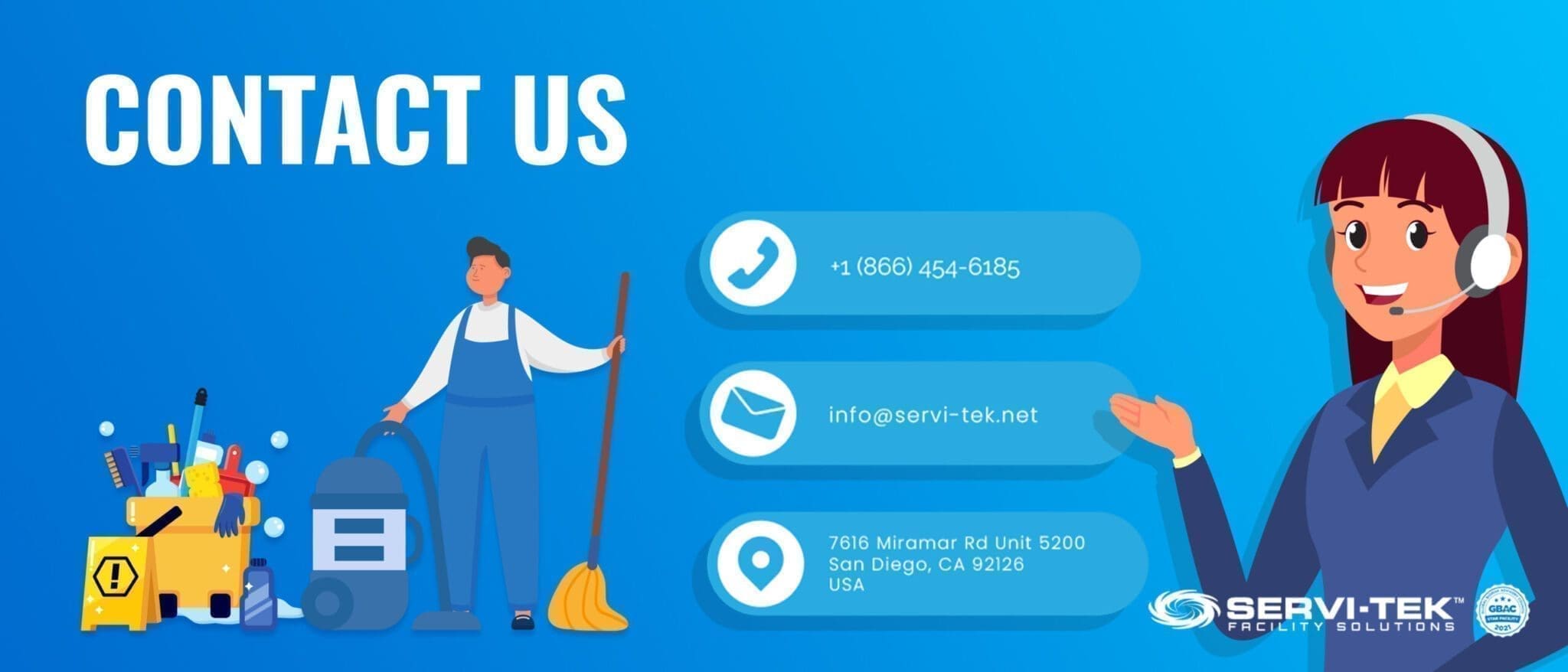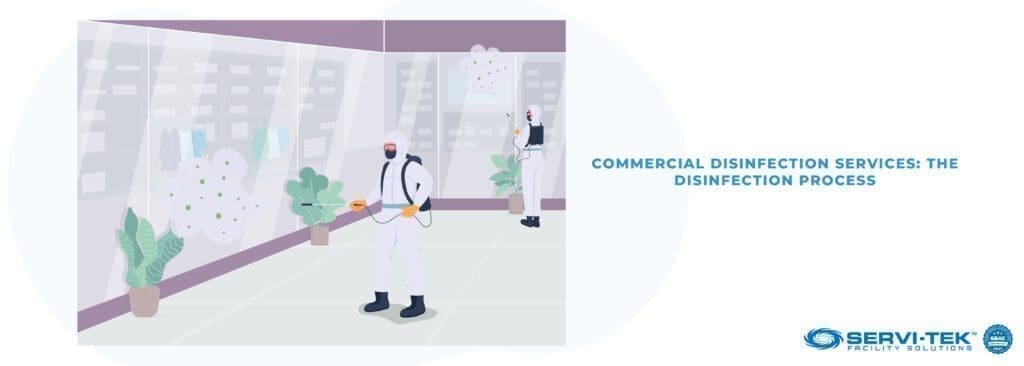
As a facility manager or business owner, you need to take the right steps to ensure your premises are properly disinfected if you want to control the spread of infection.
COVID-19 is the most recent health concern, but not the only one.
Why should you disinfect your property, how it can benefit your business and why is it vital for you to do it?
All of these questions and more will be answered in the following blog post.
Why Do We Disinfect?
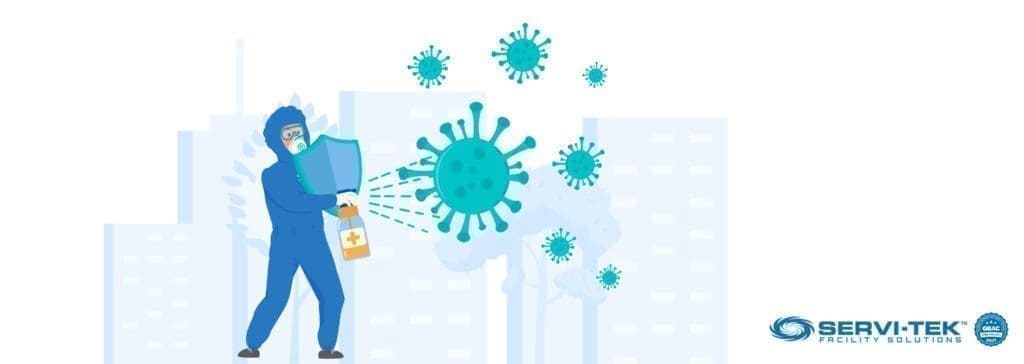
Many organizations are shifting back to regular on-premise work schedules. Some haven’t even stopped fully from working on-premise, due to the nature of the business.
It is now more important than ever for business owners to pay attention to the safety of their clients, workforce, and partners.
Did you know that coronavirus is known to survive on surfaces for over 24 hours?
The solution to this is proper disinfection. It can effectively remove 99.999% of germs, as long as the right cleaning techniques and solutions are used.
You should consider disinfection for several reasons, such as:
- Maintaining workplace health.
- Holding high standards of hygiene.
- Boosting employee productivity.
- Instilling a sense of confidence in employees to return to work.
- Preventing the spread of infection.
- Reducing the possibility of sick days.
- Reducing the risk of a possible contagion spread.
How Does Disinfection Work?
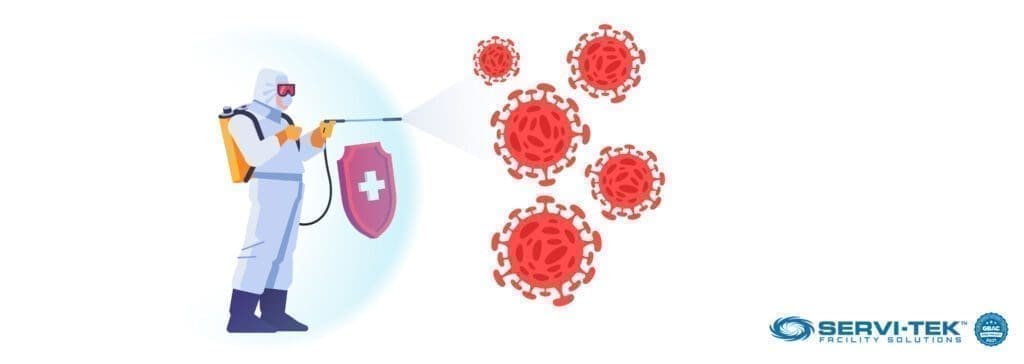
The majority of viruses, bacteria, and pathogens can live on surfaces for days on end. The only way to effectively remove and kill them is through disinfection.
Every virus aims to replicate itself. However, to do this the virus needs to infect healthy cells. Surfaces are just temporary homes for pathogens, as they wait patiently before latching on to a viable biological body.
Contaminated surfaces can transfer viruses from one place to the next. Disinfectants essentially help in removing such threats from a surface.
They work on damaging the external cellular structure so that it cannot replicate itself.
You need to understand that the right type of disinfectant solution is required to remove different types of germs.
When Is Disinfection Necessary?
It is not enough to just clean your premises.
You must disinfect and sanitize them as well. Otherwise, you just remove surface dirt, while the microbes and health threats thrive and form entire colonies.
Disinfection is necessary if you are calling your workforce back to on-premise routine working.
CDC and OSHA recommend regular and frequent disinfection for all commercial facilities, such as offices, warehouses, retail malls, factories, schools, hospitals, and others.
Types and Methods Of Disinfection
Disinfectants can either be used alone or in combination.
This makes it necessary to work with a knowledgeable and trained commercial cleaner that understands your needs and is backed up by experience.
There are several commercial formulations available in the market. You need to ensure the products are registered with the EPA and cleared by FDA.
You can find below a few disinfection methods. It is best to familiarize yourself with the terms, and then discuss with professionals what is the best approach for your facility.
Chemical Disinfectants
- Glutaraldehyde
- Hydrogen peroxide
- Iodophors
- Alcohol
- Chlorine and chlorine compounds
- Formaldehyde
- Ortho-phthalaldehyde (OPA)
- Peracetic acid
- Peracetic acid and hydrogen peroxide
- Phenolics
- Quaternary ammonium compounds
Other Methods
These miscellaneous inactivating agents are generally not used in a commercial setting.
- Other germicides
- Metals as microbicides
- Ultraviolet radiation
- Flushing- and washer-disinfectors
Why Choose Commercial Disinfection?
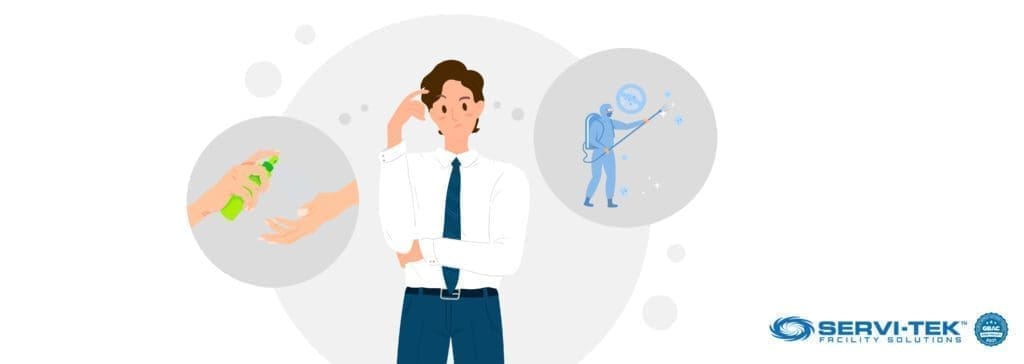
Commercial cleaning is important to every business operating in the present COVID-19 era. Experienced cleaning professionals can sanitize your environment to reduce health hazards and make a good first impression on potential clients.
These are a few reasons why you should choose commercial disinfection:
1. Remove the Hassle from Disinfection
One of the greatest benefits of commercial disinfection and cleaning services is that they don’t disrupt the flow of your business.
Workers may need to clean and disinfect when they could be putting their hours to more productive use.
A good commercial disinfection service will work around your business hours to ensure everything runs smoothly.
2. Customized Plans
You should know what you are paying and what you are getting when buying something.
Most commercial cleaners offer free quotes and the services on offer so that you can make an informed decision.
Reliable cleaning and disinfecting service providers offer customized plans catered to suit unique business needs as well.
3. Leave It to the Professionals
Disinfecting involves the use of harsh and potent chemicals. Your in-house cleaning crew may not know the right method to use these, which can cause unnecessary exposure and safety concerns.
Also, they might not have adequate personal protective equipment (PPE), such as face masks and gloves.
It is best to work with disinfectant professionals when in doubt. Experienced providers know the right amount and type of cleaning solutions to use. They also know which areas pose a more dangerous threat, and how to deal with each surface material and its particularities.
4. Appropriate Equipment
An important aspect of disinfection is having the right tools for the job. Commercial service providers have the right tools for the job.
You might think wipes and other sprays are a good solution, but don’t let yourself fall for it. They won’t do as good a job as a higher-grade cleaning solution.
Professional disinfection services have access to EPA registered cleaning solutions that provide the best results.
How Does Disinfection Differ from Sterilization, Cleaning, and Sanitization?
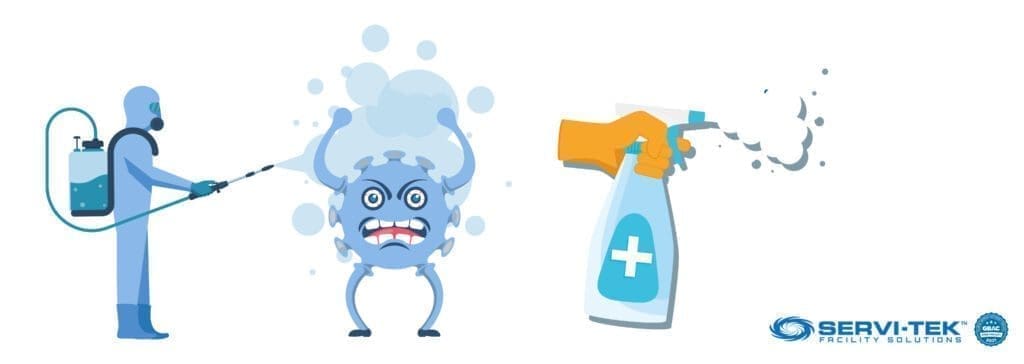
You need to know the difference between disinfection, cleaning, sanitization, and sterilization when it comes to keeping a facility in top shape.
These terms are not interchangeable, although many confuse them.
Cleaning refers to removing all visible dirt, grime, and other types of debris from a surface. Mechanical cleaning involves physical actions, such as scrubbing or scraping to remove the contaminants from a surface or object.
Sanitization is the process of reducing the number of germs to a safe and acceptable level. Sanitizing agents are mainly used for destroying bacteria from a given surface.
Disinfection is the process of killing almost 100% of germs on a surface. When special products are used appropriately, they destroy almost all organisms in just 10 minutes. However, you need to use disinfectants that are efficient, and in the right concentration.
Sterilization involves the use of an autoclave or a machine equally powerful to remove 100% microorganisms, including fungal spores, mold, mildew, and viruses from a surface.
However, you should know that autoclaves are not a practical cleaning solution for big, busy buildings, and are rather used for smaller objects.
Disinfection Of Hard, Nonporous Surfaces
Commercial cleaners are aware that visibly dirty surfaces cannot be disinfected directly.
They need to be cleaned first, to remove all impurities.
Make sure your cleaning crew wears disposable gloves and changes them when moving to a different area. This helps in preventing cross-contamination.
Hard surfaces are often touched during the day by multiple people and need special attention during the process.
Here are the standard nonporous surfaces you can find in your facility:
- Countertops
- Bathroom surfaces
- Tabletops
- Desktops
- Drinking Fountains
- Doorknobs/door handles
- Chairs
You should consider hiring a commercial disinfection service provider that cleans high-touch surfaces multiple times a day. It is important to use the proper sanitization chemicals on electronic items as well.
Mouse and keyboards have been recognized as potential contagion spread risks.
Bactericidal And Sporicidal Disinfectants
Bactericidal and sporicidal disinfectants are different.
Bactericidal disinfectants are mainly targeted to kill bacteria, such as C. Difficile and E. Coli. These are generally alcohol-based, especially isopropyl and ethylene. The disinfectant damages the cell membrane of bacteria and other germs. They are specially formulated for nonporous surfaces.
On the other hand, sporicidal disinfectants reduce fungal spores.
They include acetic acid, hydrogen peroxide, and peracetic acid. These can be used as sterilants, sanitizers, and broad-spectrum disinfectants for effective and fast microbial control.
How To Select the Appropriate Disinfection Solution?
You need to opt for the right solution if you want effective disinfection of your premises. Commercial coronavirus disinfection services know the importance of adhering to the manufacturer’s label instructions.
These are a few factors you should consider while evaluating the potency and efficacy of a disinfectant solution:
- Does it kill almost all pathogens?
- How fast is the kill time?
- Does it need to be left on a surface for a long time?
- Can it be used with an electrostatic sprayer?
- Does it compromise safety for efficiency?
- Is it easy to use?
- How much does it cost?
What Disinfectants Can And Cannot Do?
There is a lot of disinfectants that can get the job done in term of maintaining health at your workplace.
You need to understand one important thing: just wiping or spraying a surface with disinfectant doesn’t prevent pathogens from returning to it.
Disinfectants work on damaging the outer wall and cellular structure in viruses and bacteria.
However, they don’t form a protective coating on hard or porous surfaces to prevent pathogens from future infections. This is why the CDC and the WHO recommend regular and frequent disinfection of high-traffic areas.
The best thing you can do is to consider working with a commercial cleaning company. This way, you ensure that all high-touch surfaces are frequently sanitized and disinfected.
Need Some Help? We Have A Plan!
You shouldn’t leave the safety and health of your workers or your reputation to chance and amateurs.
The cleaning professionals at Servi-Tek are here to help you remove all biohazard contaminants from your premises.
We use CDC-approved and EPA-certified disinfection methods. Our professionally trained staff has years of experience and is capable to provide any additional service that you may require.
Our services include industrial, medical, office, and restroom disinfection, among others.
Give us a call today at 866-454-6185 or use our online form to schedule an appointment and see for yourself!



